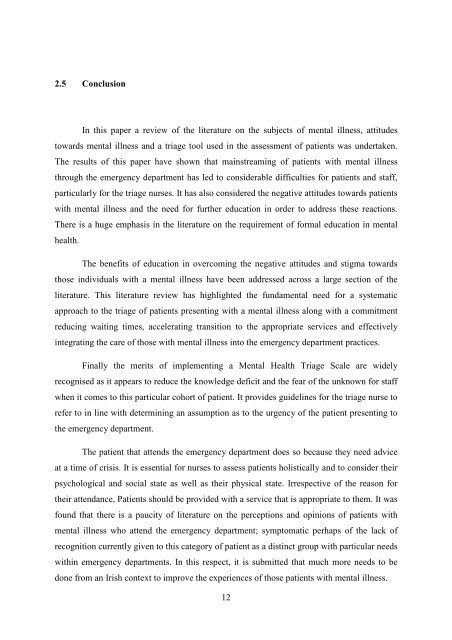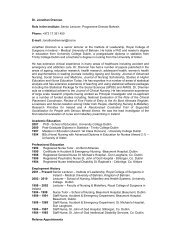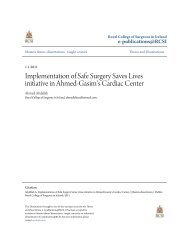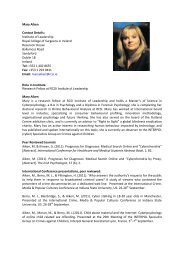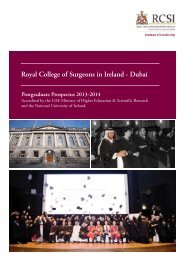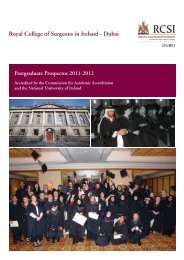Improving the Assessment and Triage of Patients with Mental Illness ...
Improving the Assessment and Triage of Patients with Mental Illness ...
Improving the Assessment and Triage of Patients with Mental Illness ...
Create successful ePaper yourself
Turn your PDF publications into a flip-book with our unique Google optimized e-Paper software.
2.5 Conclusion<br />
In this paper a review <strong>of</strong> <strong>the</strong> literature on <strong>the</strong> subjects <strong>of</strong> mental illness, attitudes<br />
towards mental illness <strong>and</strong> a triage tool used in <strong>the</strong> assessment <strong>of</strong> patients was undertaken.<br />
The results <strong>of</strong> this paper have shown that mainstreaming <strong>of</strong> patients <strong>with</strong> mental illness<br />
through <strong>the</strong> emergency department has led to considerable difficulties for patients <strong>and</strong> staff,<br />
particularly for <strong>the</strong> triage nurses. It has also considered <strong>the</strong> negative attitudes towards patients<br />
<strong>with</strong> mental illness <strong>and</strong> <strong>the</strong> need for fur<strong>the</strong>r education in order to address <strong>the</strong>se reactions.<br />
There is a huge emphasis in <strong>the</strong> literature on <strong>the</strong> requirement <strong>of</strong> formal education in mental<br />
health.<br />
The benefits <strong>of</strong> education in overcoming <strong>the</strong> negative attitudes <strong>and</strong> stigma towards<br />
those individuals <strong>with</strong> a mental illness have been addressed across a large section <strong>of</strong> <strong>the</strong><br />
literature. This literature review has highlighted <strong>the</strong> fundamental need for a systematic<br />
approach to <strong>the</strong> triage <strong>of</strong> patients presenting <strong>with</strong> a mental illness along <strong>with</strong> a commitment<br />
reducing waiting times, accelerating transition to <strong>the</strong> appropriate services <strong>and</strong> effectively<br />
integrating <strong>the</strong> care <strong>of</strong> those <strong>with</strong> mental illness into <strong>the</strong> emergency department practices.<br />
Finally <strong>the</strong> merits <strong>of</strong> implementing a <strong>Mental</strong> Health <strong>Triage</strong> Scale are widely<br />
recognised as it appears to reduce <strong>the</strong> knowledge deficit <strong>and</strong> <strong>the</strong> fear <strong>of</strong> <strong>the</strong> unknown for staff<br />
when it comes to this particular cohort <strong>of</strong> patient. It provides guidelines for <strong>the</strong> triage nurse to<br />
refer to in line <strong>with</strong> determining an assumption as to <strong>the</strong> urgency <strong>of</strong> <strong>the</strong> patient presenting to<br />
<strong>the</strong> emergency department.<br />
The patient that attends <strong>the</strong> emergency department does so because <strong>the</strong>y need advice<br />
at a time <strong>of</strong> crisis. It is essential for nurses to assess patients holistically <strong>and</strong> to consider <strong>the</strong>ir<br />
psychological <strong>and</strong> social state as well as <strong>the</strong>ir physical state. Irrespective <strong>of</strong> <strong>the</strong> reason for<br />
<strong>the</strong>ir attendance, <strong>Patients</strong> should be provided <strong>with</strong> a service that is appropriate to <strong>the</strong>m. It was<br />
found that <strong>the</strong>re is a paucity <strong>of</strong> literature on <strong>the</strong> perceptions <strong>and</strong> opinions <strong>of</strong> patients <strong>with</strong><br />
mental illness who attend <strong>the</strong> emergency department; symptomatic perhaps <strong>of</strong> <strong>the</strong> lack <strong>of</strong><br />
recognition currently given to this category <strong>of</strong> patient as a distinct group <strong>with</strong> particular needs<br />
<strong>with</strong>in emergency departments. In this respect, it is submitted that much more needs to be<br />
done from an Irish context to improve <strong>the</strong> experiences <strong>of</strong> those patients <strong>with</strong> mental illness.<br />
12


